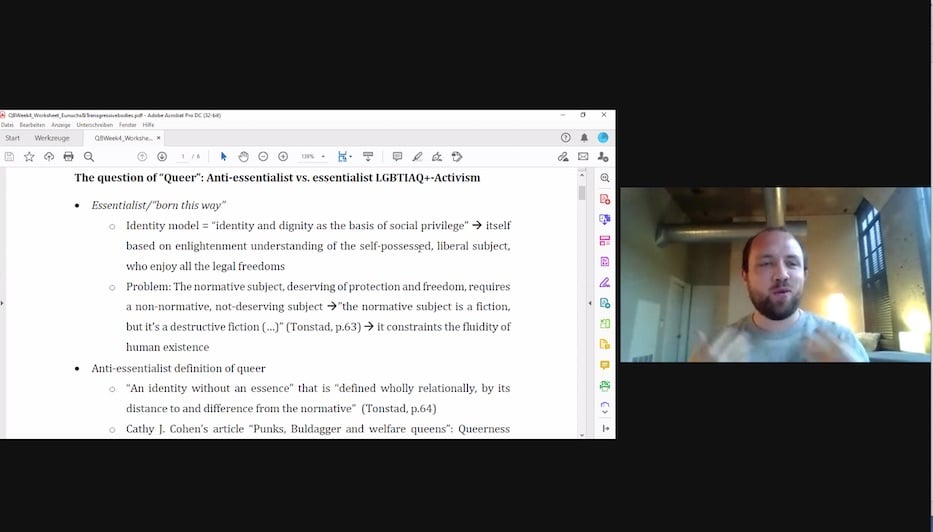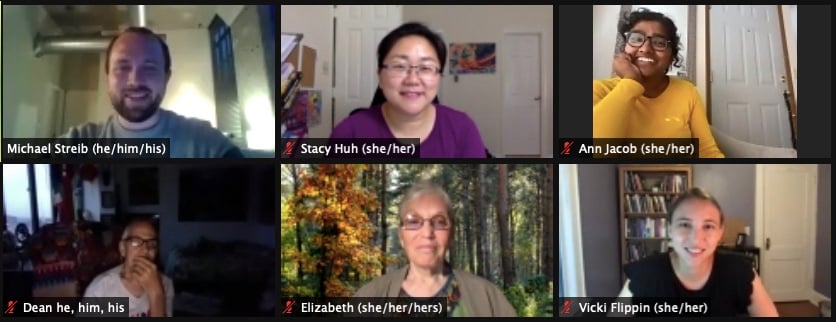
Faith & Spirituality | First and Summerfield United Methodist Church | LGBTQ | Religion & Spirituality | Arts & Culture | News From The Pews

Leah Andelsmith Photo.
The participants of Queerly Beloved listened attentively to the video playing on their screens. Some nodded in time to the music and some just closed their eyes as India Arie strummed and sang: “I am not my age / I am not my race / My soul inside is all light.”
“Queerly Beloved: A Bible Study on Queerness, Theology and Lived Faith” is a Bible study and discussion group at First and Summerfield United Methodist Church (UMC) running now through July 27. Weekly virtual meetings include participants from around the country alongside New Haveners and are facilitated by Yale Divinity School student and First and Summerfield Intern Michael Streib.
Having come from a liberal household headed by parents who were both pastors, Streib was “in touch with theology early on,” he said. After taking a queer theology class last semester, he was eager to create a queer space and bring those ideas into a conversational setting.
Intersectionality is a core principle of Streib’s work with Queerly Beloved. The concept was defined in 1989 by Kimberlé Crenshaw to describe the way that Black women often face discrimination that isn’t addressed by social justice efforts that only target race or gender alone. It can be applied to the intersection of many other factors such as class, ability, or sexuality, and in recent years the term has become a shorthand for describing a multi-faceted identity.
“As soon as you are queer and Christian, you cannot avoid being at the intersection,” he said. When he came out as gay, he experienced this as a “positive intersection,” and found that “my faith helped me come to terms with myself better and get rid of internalized homophobia.”
He has used that as foundation to serve others who may not have had such a positive experience, and has found queer ministry to be “life-giving and beautiful.”

Last Tuesday’s discussion focused on gender fluidity and the role of eunuchs in the New Testament, a topic that was new for many participants. In ancient Jewish and Roman societies, Streib explained, eunuchs were widely reviled because they did not fit the accepted gender roles of the time. In addition, they were often foreigners in these societies, which lends their identities a dimension people might call intersectional today.
In the New Testament, Streib said, eunuchs are mentioned only eight times, but never portrayed as people who need healing. For many who have studied them, these scant passages not only normalize the existence of eunuchs, but also place them close to the kingdom of heaven. Streib presented the work of several scholars who derive an inclusive message from the text: by existing outside of the gender binary, eunuchs are intersectional figures that symbolize God’s new kingdom, a kingdom in which those who are marginalized will be centered.
To underscore this point, Streib included in the week’s readings a passage from Galatians that read in part: “There is no longer Jew or Greek, there is no longer slave or free, there is no longer male and female; for all of you are one in Christ Jesus.” (Galatians 3:28)
Participants gave each other plenty of space to explore. Thoughtful pauses between each comment suggested that folks were listening curiously and attentively to each other, rather than planning what to say next. In short breakout sessions and a full-group discussion, participants shared personal connections to the text and reread passages that struck home.
Yolanda Castro-Arcé, who identifies as an ally, related the Galatians passage back to the opening song, “I Am Light.”
“At what point did we start separating [people] out, [saying] these weaker ones are female, these weakest ones are children, and so on?” she said. “Just like the song, I’m not my age. I’m not my past. I’m divinely God’s. That’s a beautiful passage to read now.”

Stacy Huh shared that she once gave a sermon on one of the week’s readings, Acts 8:26-40. The story describes how Phillip was directed by the Holy Spirit to cross paths with a eunuch serving in the court of the queen of Ethiopia. At the moment of their meeting, the eunuch is reading from Isaiah, the Old Testament writings of a prophet that, for Christians, foretells the coming of Jesus Christ. Phillip uses that connection to teach him about Jesus, and the eunuch asks to be baptized.
The encounter ends on a note of rejoicing. Huh emphasized the fact that the eunuch was specifically chosen by the Holy Spirit to be brought into the fold.
“Those that are different in their gender are a huge blessing in God’s kingdom,” she said.
After the Bible study concluded, Castro-Arcé, Huh and several others stayed on the call to discuss the ways that, in the span of just a few weeks, Queerly Beloved has become important to them.
Many pastors and lay people in the group want to work towards a more inclusive church, often in contrast to their previous, less- or non-welcoming experiences. At Queerly Beloved they are learning more about how to do that. The group comes less than a month after the British Methodist Church formally voted to accept same-sex marriage in the denomination, both putting an end to a long-simmering debate and causing a schism among more conservative faith leaders in the church. It remains a topic of fierce debate within the UMC domestically.
Elisabeth, who has had a “marvelous journey” as an out lesbian for the past 40 years, had “never paid much attention to the Bible.” She decided it was time to learn more about it in order to “be able to speak up” in the face of discrimination.
“It’s been one revelation after another, not just about the Bible but the way people share afterwards,” she said. “The way we are vulnerable with one another and ask each other for ideas and help. I just feel enveloped and it’s beautiful.”
Ann Jacob, who is a lay person serving a UMC congregation north of Seattle as their first openly queer pastor, said that “returning to these passages and seeing them with new eyes has been a blessing and a gift.” She counts the stories and experiences of all the participants as another blessing.
For Jacob, the group is a way to do the deep, challenging, and very personal work required to create change in the church. Serving “from the intersection of many identities—millennial, woman, brown, queer,” she invited her congregants to join the Bible study because she wanted them “to be able to wrestle with these ideas.”
In fact, many in the group were wrestling with one big idea: How do we change the church? Should we even try? The fact that participants returned to these questions again and again didn’t make them any easier to answer.
Jacob suggested that pastors can “lead from the pulpit” by offering opportunities for conversation.
Rev. Vicki Flippin of First and Summerfield pointed out that many churches are still following 50-year-old theology, often unaware of “exciting and beautiful” ideas from the theological academic world that are “more democratic than they have ever been.” Interns like Streib are a way to bridge that gap.
One participant named Christopher cautioned against a singular focus on “getting the theology right.” The danger is remaining satisfied with the abstract idea of being queer-affirming and not moving beyond it into real-world action.
Queerly Beloved is helpful because it “creates a seriousness of what is at stake,” he said. “This theology has a mental health impact. This is urgent to youth around the world.”
Throughout the evening, it felt like Arie’s “I Am Light” was ringing out through the words of the participants, providing a continuous thread through their conversation:
I am divinity defined
I am the god on the inside
I am a star, a piece of it all
I am light
At the beginning of the evening, Streib said the song was a “reminder that we are all light and children of God in this Bible study group, regardless of the systems of oppression we are living under and our histories and life stories.”
And as the evening concluded, Streib offered a blessing to the participants.
“May God who transgresses boundaries over and over again bless you on your journey,” he prayed. “May God help you to find all the beauty and diversity in you and around you. May God make you part of God's kin-dom that accepts and welcomes and loves everyone.”
“Queerly Beloved: A Bible Study on Queerness, Theology and Lived Faith” runs through July 27 online. Find out more about it here.

